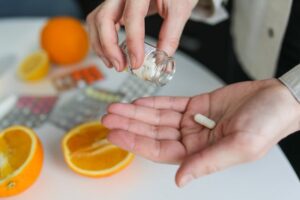Iron is crucial for the normal functioning of various important organs in the human body. Its primary role is to facilitate the production of hemoglobin, which is a key substance in red blood cells responsible for carrying oxygen. In infants, the normal hemoglobin level should be maintained between 11 to 13 grams. When hemoglobin drops below 11 grams, it is diagnosed as anemia. If the underlying cause of anemia is due to a lack of iron, it is referred to as "iron deficiency anemia."
What are the Harms of Iron Deficiency Anemia?
- Skin around the eyelids, lips, gums, or nail beds appears pale pink.
- Delayed physical development, slow growth in height.
- Prolonged iron deficiency anemia in children can lead to slow cognitive development.
- Decreased immune function, increasing the risk of infectious diseases in children.
- Children may experience lack of concentration, decreased learning ability, and weakened cognitive abilities.
- Symptoms such as persistent fatigue, decreased physical strength are common.
- Increased burden on the child's heart, leading to impaired cardiac function.
- Changes in personality, becoming irritable and temperamental.
How to Prevent Iron Deficiency Anemia?
- Extend breastfeeding duration as much as possible: Breast milk has high bioavailability of iron, with about 50% to 75% being absorbed by babies.
- Feed babies with iron-fortified formula: If unable to continue breastfeeding, feed babies with iron-fortified formula for at least one year, or until the baby has alternative dietary sources.
- Avoid giving cow's milk to babies under 1 year old: Cow's milk has a very low iron content, and excessive consumption can exacerbate iron deficiency symptoms.
- Limit the amount of cow's milk for toddlers in the walking stage: Toddlers in the walking stage should not drink more than 710 milliliters of milk per day.
- Pay attention to feeding intervals: Allow at least a 20-minute interval between breastfeeding and offering solid foods to babies.
- Supplement with iron-rich foods: Eating fruits and fruit juices rich in vitamin C can enhance iron absorption. Avoid drinking milk during meals, as it can reduce the absorption of iron in food. For infants just starting complementary feeding, choose iron-fortified foods such as iron-fortified infant cereal, pureed meats, and legumes. For older children, good sources of iron include red meat, poultry, fish, legumes, and spinach.
By maintaining a balanced diet, adopting healthy lifestyle habits, and undergoing regular health check-ups, we can effectively prevent iron deficiency anemia in children. This not only helps to safeguard children's health and development but also enhances their immunity, enabling them to lead healthier, more energetic, and happier lives.
References: 《The Sears Parenting Library》, MFMER













